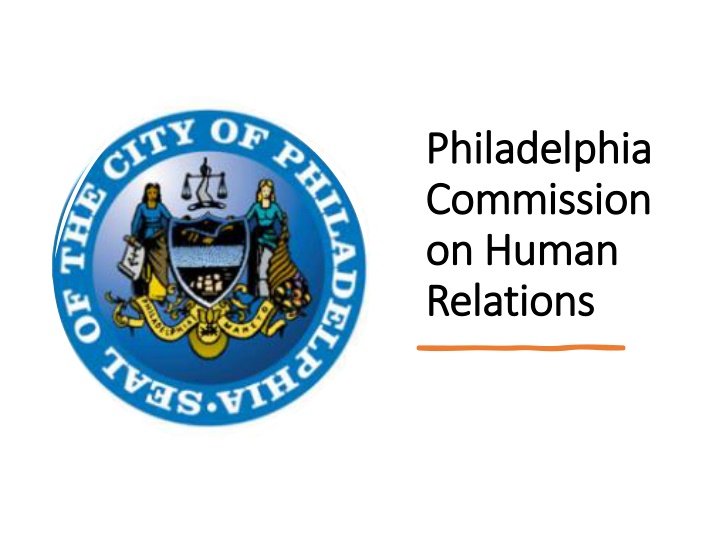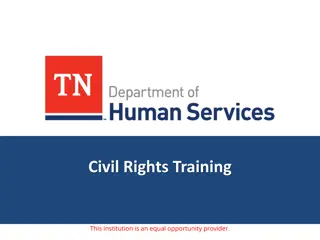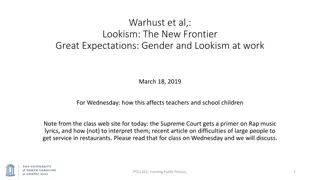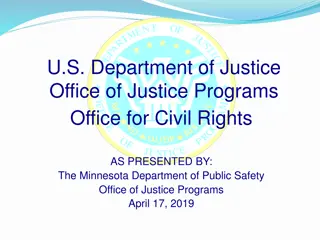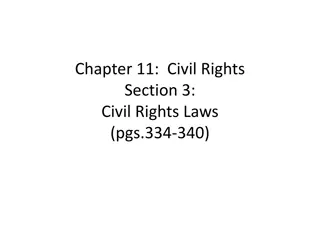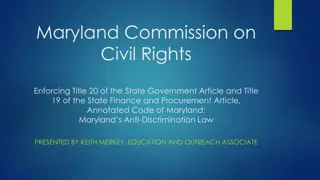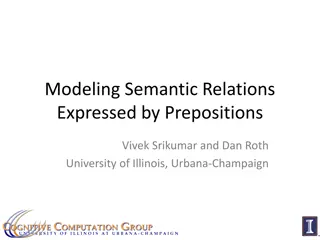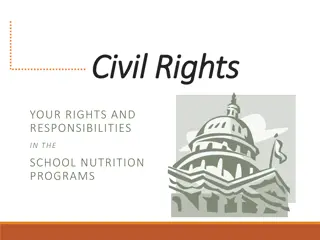Philadelphia Commission on Human Relations - Upholding Fair Practices and Civil Rights
Established in 1951, the Philadelphia Commission on Human Relations (PCHR) enforces civil rights laws to combat discrimination in employment, housing, and public accommodations. The Fair Practices Ordinance (FPO) prohibits discriminatory practices based on protected classes such as race, ethnicity, gender, disability, and more. PCHR ensures compliance with the FPO through investigations, remedies, and legal actions.
Download Presentation

Please find below an Image/Link to download the presentation.
The content on the website is provided AS IS for your information and personal use only. It may not be sold, licensed, or shared on other websites without obtaining consent from the author.If you encounter any issues during the download, it is possible that the publisher has removed the file from their server.
You are allowed to download the files provided on this website for personal or commercial use, subject to the condition that they are used lawfully. All files are the property of their respective owners.
The content on the website is provided AS IS for your information and personal use only. It may not be sold, licensed, or shared on other websites without obtaining consent from the author.
E N D
Presentation Transcript
Philadelphia Philadelphia Commission Commission on Human on Human Relations Relations
PCHR Who Are We Established in 1951 under the City s Home Rule Charter Enforce civil rights laws, Fair Practices Ordinance (FPO), Section 9-1100 of the Philadelphia Code FPO prohibits discrimination in employment, housing and public accommodations
The FPO 9-1104 Unlawful Housing Practices For any owner to refuse to sell, rent, lease or in any way discriminate against an individual on the basis of the individual s protected class. For any person to print or circulate any advertisement or use any application that limits a person s housing opportunities based on the basis of the individual s protected class For any person to retaliate against a person after they have filed a housing discrimination complaint For any lending institution to discriminate in lending, loans, accepting mortgages.
The FPO 9-1104 Unlawful Housing Practices
Protected Classes race ethnicity color sex sexual orientation gender identity religion national origin ancestry disability age marital status domestic or sexual violence victim status source of income familial status
Theories of Discrimination Theories of Discrimination Disparate Treatment: Landlord treats a specific protected class differently from others. Respondent fails to rent to Black or Latino applicants who have a criminal records but rents to similarly situated White applicants with criminal records. Disparate Impact: Landlord has a facially neutral policy or practice which disproportionately impacts a specific protected class. Refusing to renew lease of any tenant that calls 911 more than twice in one year impacts women..
The FPO 9-1110 Remedies Cease and desist order Injunctive or equitable relief Compensatory damages Punitive Costs and Expenses Attorneys fees damages, $2,000 per violation
The FPO 9-1109 (1) Exemptions Exemptions Religious entities can give preference in the occupancy, leasing, sale or purchase of real property to those within the same religion. Those leasing/renting a room or rooms within their personal home (except in the case of Limited Lodging, as defined in 14-604(13). (i.e. Air BnB)). Federally regulated senior homes.
The FPO 9-1104 Additional Unlawful Housing Practices
Section 9-810 Renter s Access Act Establishes new limitations on what a landlord may review when considering a rental application Landlord must post Uniform Screening Criteria Can be screened for: Can be screened for: Rental History References Evictions within the last 4 years Relevant Credit history Income Relevant Criminal History ID verification Cannot use only: Cannot use only: Credit score or tenant screening score Eviction record Cannot be Screened for Cannot be Screened for Evictions more than 4 years prior Evictions did not end in judgment for the landlord Evictions withdrawn or marked satisfied or sealed Evictions filed during Covid emergency period Failure to Pay rent or utility bills during Covid emergency period
Section 9-810 Renter s Access Act Continued If a landlord rejects an application landlord must: notify applicant in writing or electronically within 3 business days provide the applicant a written explanation of why the tenant was rejected. provide copy of any third-party report used to make decision to reject application Establishes a dispute process whereby the tenant may challenge the rejection. Notify landlord with in 48 hours intent to dispute rejection Within 7 days provide evidence information the landlord relied on inaccurate or incorrectly attributed to tenant or prohibited provide evidence of mitigating circumstances
Section 9-810 Renter s Access Act Continued If landlord rejects an application landlord must: Notify applicant in writing or electronically within 3 business days Provide the applicant a written explanation of why the tenant was rejected. Provide copy of any third-party report used to make decision to reject application If violation found tenant may file applicant may file claim in court. Remedy: Landlord must offer rejected applicant next available dwelling of comparable size and rental price. Exceptions: Landlords with 4 or fewer dwelling within Philadelphia exempt from requirement to offer next available rental unit to rejected applicant Public housing
THANK YOU! Karen Forman, Esq. Philadelphia Commission on Human Relations www.phila.gov/humanrelations
